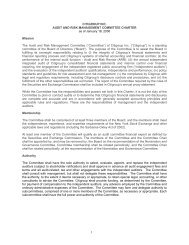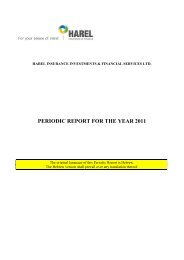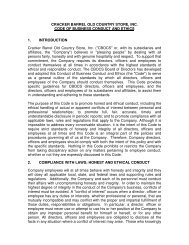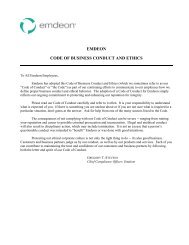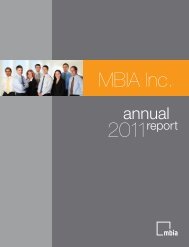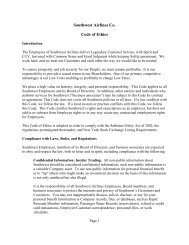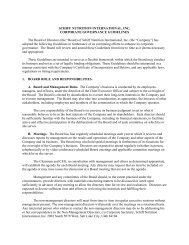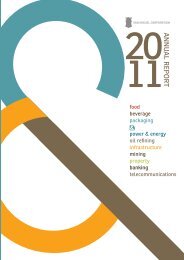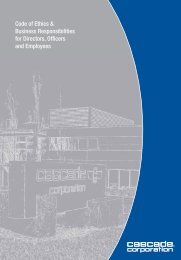CODE OF CONDUCT - Thecorporatelibrary.net
CODE OF CONDUCT - Thecorporatelibrary.net
CODE OF CONDUCT - Thecorporatelibrary.net
Create successful ePaper yourself
Turn your PDF publications into a flip-book with our unique Google optimized e-Paper software.
<strong>CODE</strong> <strong>OF</strong> <strong>CONDUCT</strong><br />
IPG <strong>CODE</strong> <strong>OF</strong> <strong>CONDUCT</strong> 1
Our Values<br />
Strategic<br />
Creativity<br />
Dedicated<br />
To Success<br />
Executional<br />
Excellence<br />
Promote<br />
Collaboration<br />
And Growth<br />
Integrity And<br />
Transparency<br />
ii<br />
IPG <strong>CODE</strong> <strong>OF</strong> <strong>CONDUCT</strong>
Letter from the CEO<br />
Dear Colleagues,<br />
In a service industry like ours, two qualities remain at the heart of what we do—relationships and trust.<br />
To strengthen both of those, we must operate with integrity and transparency in all of our interactions with clients<br />
and other partners. When that happens, our connections with everyone we do business with will thrive. That’s<br />
why integrity and transparency are among our corporate values and why our Code of Conduct is crucial<br />
to our ongoing success.<br />
Interpublic’s Code of Conduct is the foundation of how we should do business on a day-to-day basis.<br />
It provides us with guidance on how to work with our colleagues, vendors, clients and others with whom we may<br />
interact as we do business. We operate globally and our world has become increasingly complex. Which is<br />
one of the reasons we chose to review and re-vamp our Code of Conduct.<br />
Although the format and style of the Code have been updated, the rules remain the same. The Code<br />
is designed to provide guidance for you as you go about your work on a daily basis, particularly in situations that<br />
may be challenging or uncomfortable. In addition to the Code itself, there are several resources available<br />
to you to help you navigate challenging situations at work. We encourage you to read the Code and if you have<br />
questions about it or about situations you encounter, to talk with your manager, your local human resources<br />
director, the IPG Legal Department or our Chief Risk Officer.<br />
It is only when we operate with integrity and trust that we can do our jobs as effectively and successfully as<br />
possible. Thank you for reading and certifying your acknowledgment of the Code and for doing your part to<br />
contribute to our success.<br />
Michael Roth<br />
Chairman and CEO, Interpublic<br />
IPG <strong>CODE</strong> <strong>OF</strong> <strong>CONDUCT</strong> iii
Table of Contents<br />
Our Values<br />
ii<br />
Letter from the CEO<br />
iii<br />
Following the Code 1<br />
Seeking Guidance and Reporting Potential Violations 2<br />
Non-Retaliation 3<br />
Disciplinary Action 3<br />
Additional Expectations for Managers 3<br />
Acting with IPG and Our Shareholders in Mind 4<br />
Conflicts of Interest 4<br />
Gifts and Entertainment 5<br />
Asset Protection 7<br />
Data Privacy and Security 8<br />
Business Records 11<br />
Accurate Communications 12<br />
Insider Trading 13<br />
Acting with Our Clients and<br />
Business Partners in Mind 17<br />
Ethical Sales Practices 17<br />
Fair Purchasing Practices 17<br />
Competition Laws 17<br />
Protection of Third-Party Information 19<br />
Acting with Each Other in Mind 20<br />
Respect for Diversity 20<br />
Discrimination 20<br />
Harassment 20<br />
Personal Relationships 21<br />
Workplace Safety and Health 21<br />
Acting with Our Communities in Mind 23<br />
Sustainability 23<br />
Community Involvement 24<br />
Anti-Corruption Laws 24<br />
Trade Controls 25<br />
Anti-Boycott 25<br />
Political Activities 25<br />
Waivers and Amendments 27<br />
Confidentiality and Non-Solicitation Agreement 28<br />
Confidentiality 28<br />
Non-Solicitation<br />
(Employees Who Work Outside of California) 29<br />
Non-Solicitation<br />
(Employees Who Work in California) 29<br />
Compliance Certification Form 30<br />
Compliance Report Form 31<br />
iv<br />
IPG <strong>CODE</strong> <strong>OF</strong> <strong>CONDUCT</strong>
Following the Code<br />
At IPG, we take pride in our reputation for creativity and high moral and ethical standards. We have built<br />
this reputation by adhering to sound and equitable business ethics and a set of values shared by all of our<br />
companies, agencies, subsidiaries and affiliates. The Code of Conduct (“Code”) serves as a statement of our<br />
continued commitment to acting with transparency and integrity in all of our business dealings.<br />
The Code is not a comprehensive document that addresses every ethical issue that we might face or all<br />
of the laws and policies that apply to all IPG businesses. Instead, the Code shows us the general standards<br />
of conduct that have always been and continue to be expected of all IPG employees, officers and directors in<br />
our day-to-day activities. These standards guide our interactions with each of our stakeholders to promote<br />
collaboration and growth. In addition, the Code provides us with resources to use when we have questions or<br />
concerns. We will all be expected to certify our compliance with the Code annually.<br />
Each of us must take care to know and follow the policies, procedures and laws that apply to our particular<br />
job functions. Laws and regulations are complex and subject to change, and often vary from one country<br />
to the next. IPG policies may also be subject to change, and may vary depending on our location. You can<br />
find many applicable and up-to-date policies in Interpublic’s Standard Policies and Procedures (SP&Ps) at<br />
http://inside.interpublic.com. If you need more help to determine whether an action is lawful or ethical, seek<br />
advice from the IPG Legal Department or one of the other resources listed in “Seeking Guidance and Reporting<br />
Potential Violations.”<br />
We seek out vendors, consultants, freelancers and other business partners that share Interpublic’s values<br />
and ethical standards, and uphold the Code in the work they do for IPG. If you believe that any of these<br />
partners are not meeting these standards, you are strongly encouraged to report the situation. For further<br />
details, please see the External Party Policy (SP&P 610).<br />
IPG <strong>CODE</strong> <strong>OF</strong> <strong>CONDUCT</strong> 1
Seeking Guidance and Reporting Potential Violations<br />
While engaging in your day-to-day business<br />
activities, you may find yourself in a situation where<br />
you are unsure of the right course of action. Your<br />
good judgment, along with the Code and other<br />
Interpublic policies, may be sufficient guides. If your<br />
situation is more complex, seek guidance.<br />
To obtain guidance, you should first consult your<br />
immediate manager. Face-to-face communication<br />
is often the best way to resolve work-related<br />
problems. If you are uncomfortable talking to your<br />
manager or still have concerns after doing so,<br />
you should consult another manager you trust or<br />
any of the following contacts:<br />
n<br />
n<br />
n<br />
n<br />
Your local Human Resources Director<br />
The Corporate Human Resources Officer<br />
The IPG Legal Department<br />
The Chief Risk Officer<br />
If you become aware of a situation that<br />
may involve a violation of the Code, IPG policy<br />
or any applicable law or regulation, you are strongly<br />
encouraged to report it to any of these contacts.<br />
You can also make a report by calling our<br />
Alertline at 1-800-828-0896 (if you are located<br />
in the United States). If you wish to make a<br />
call from any other location, please see<br />
http://inside.interpublic.com/mission%26values/<br />
alertlinefcn=AlertLineSite/Alertline06.html for local<br />
access codes. Your report will be kept confidential<br />
(and anonymous, if requested) to the full extent<br />
allowed by local law. Please remember that reporting<br />
anonymously may limit IPG’s ability to investigate<br />
your concerns. You may receive follow-up information<br />
about the outcome of such an investigation,<br />
as allowed by local law.<br />
All reports will be investigated promptly<br />
and thoroughly, and appropriate corrective or<br />
2 IPG <strong>CODE</strong> <strong>OF</strong> <strong>CONDUCT</strong>
disciplinary action will be applied whenever necessary.<br />
If requested, you will be expected to participate<br />
in an investigation of a report. For more information,<br />
please see the Communication of Theft, Fraud,<br />
or Defalcation and the Interpublic Alertline Policy<br />
(SP&P 550).<br />
Non-Retaliation<br />
Under no circumstances will you face retaliation<br />
for making a good faith report. Reporting in “good<br />
faith” means you have given all of the information<br />
you have and your report is sincere. If you believe<br />
you have been the subject of retaliation, contact<br />
anyone listed in this section. Disciplinary action will<br />
be taken against anyone who retaliates directly or<br />
indirectly against any employee as a result of a good<br />
faith report or participation in an investigation.<br />
Disciplinary Action<br />
To maintain the highest standards of integrity,<br />
we must dedicate ourselves to complying with the<br />
Code, IPG policies and procedures, and applicable<br />
laws and regulations. Please note that failure to<br />
do so can have serious consequences, including<br />
disciplinary action, up to and including termination.<br />
The extent of any disciplinary measures will<br />
depend on the circumstances of the violation. All<br />
discipline will be applied in a manner consistent<br />
with IPG’s policies and practices, as well as the law.<br />
It is also important to note that applicable<br />
regulatory authorities may impose fines and criminal<br />
or civil penalties on IPG and at-fault individuals.<br />
Managers should strive to build a work environment<br />
in which employees feel comfortable asking<br />
for help and raising concerns about compliance<br />
and ethics. They must also be alert to any situations<br />
or actions that may violate the letter or spirit of<br />
the Code or IPG policy, or may damage Interpublic’s<br />
reputation. It is important that managers take<br />
immediate action to address such situations. When<br />
managers receive reports of a situation that is<br />
u<strong>net</strong>hical, or suspect that one exists, they must<br />
promptly notify their local Human Resources<br />
Director, the Corporate Human Resources Officer,<br />
the IPG Legal Department or the Chief Risk<br />
Officer, and work to resolve the issue.<br />
Managers who know about, or should know<br />
about, misconduct and do not act promptly to<br />
report and correct the situation will be subject to<br />
disciplinary action. Managers must never engage<br />
in or tolerate retaliatory acts made against<br />
anyone working on IPG’s behalf, and are expected<br />
to clearly communicate IPG’s non-retaliation policy.<br />
Additional Expectations for Managers<br />
IPG managers must strive to create a positive<br />
work environment through both words and actions.<br />
They are expected to serve as ethical role models<br />
by exemplifying IPG’s values at all times. They<br />
must also communicate the importance of the<br />
Code and ethical conduct to others, including<br />
employees, business partners, vendors, consultants<br />
and freelancers.<br />
IPG <strong>CODE</strong> <strong>OF</strong> <strong>CONDUCT</strong> 3
Acting with IPG and Our Shareholders in Mind<br />
We dedicate ourselves<br />
to promoting growth for<br />
our shareholders by<br />
ensuring transparency<br />
and accountability in all<br />
of our business records,<br />
actions and decisions.<br />
Conflicts of Interest<br />
A conflict of interest occurs when our personal or<br />
family interests interfere—or appear to interfere—<br />
with our ability to make sound business decisions on<br />
behalf of Interpublic. We need to avoid any situation<br />
that creates even the appearance of bias. Apparent<br />
conflicts of interest can be as damaging to IPG’s<br />
reputation for honesty and integrity as an actual<br />
conflict of interest.<br />
It is important to note that merely having a<br />
conflict of interest is not a violation of the Code, but<br />
failing to disclose that conflict is. If you feel that<br />
an actual or apparent conflict of interest exists,<br />
report it immediately using the Compliance Report<br />
Form attached to the Code.<br />
This section discusses several common situations<br />
where conflicts of interest can occur. If your<br />
situation is not covered, ask yourself whether you<br />
could be accused of putting your own interests<br />
ahead of IPG’s. If you are still in doubt, disclose the<br />
situation. For more information, please see<br />
the Conflicts of Interest and Acceptance of<br />
Gifts Policy (SP&P 118).<br />
Doing Business with Family and Friends<br />
A conflict of interest can arise if you, or your<br />
spouse, partner, relative or other member of your<br />
household, have a personal stake in a company<br />
that is an actual or potential IPG vendor, client,<br />
contractor or competitor. If your spouse, partner or<br />
relative, or a member of your household, works<br />
for a vendor, client or competitor, disclose the<br />
situation on the Compliance Report Form.<br />
You must never use your position at IPG to<br />
improperly influence the bidding process or<br />
negotiation with a potential client or vendor in<br />
any way. If you are directly involved in vendor<br />
selection and have a potential conflict of interest,<br />
notify your manager immediately and remove<br />
yourself from the decision-making process.<br />
4 IPG <strong>CODE</strong> <strong>OF</strong> <strong>CONDUCT</strong>
Outside Employment and Activities<br />
At times, taking outside employment may create<br />
a conflict of interest. You may not take another<br />
position that interferes with your ability to do your<br />
job at IPG. If you are contemplating taking<br />
outside work that could in any way interfere with<br />
your job duties, speak with your manager first.<br />
None of us may take outside employment with a<br />
vendor or competitor of IPG.<br />
Serving on the board of directors or a similar<br />
body for an outside company or government agency<br />
requires the advance approval of both the Chief<br />
Executive Officer and the General Counsel. We are<br />
encouraged to be active citizens of our communities<br />
by serving on boards of non-profit or community<br />
organizations. This does not require prior approval,<br />
as long as it does not interfere with your ability to<br />
do your work.<br />
Corporate Opportunities<br />
Through your work or through contacts with<br />
clients, vendors, contractors, consultants or other<br />
business partners, you may discover an opportunity<br />
to make a purchase or an investment in which<br />
Interpublic might be interested. You may only act<br />
privately on such an opportunity after IPG has<br />
had the opportunity to evaluate it and has declined<br />
it. In order to allow IPG sufficient time to evaluate<br />
its options, you must promptly disclose investment<br />
opportunities to the IPG SVP, Finance and<br />
Development and client opportunities to the IPG SVP,<br />
Business Development.<br />
Q&A<br />
Q: Rich, an illustrator at an IPG agency,<br />
is freelancing on the weekends to put his<br />
youngest daughter through college. Although<br />
some of the freelancing work he does is<br />
similar to the work he does at the agency, he<br />
makes sure that the companies he works for<br />
are not IPG competitors. Is this okay<br />
A: Perhaps. Because Rich’s freelance work<br />
is similar to the work he does for the agency,<br />
he may be competing with IPG without even<br />
knowing he’s doing so. If this is true, it poses a<br />
conflict of interest that may not be permissible.<br />
Rich needs to disclose his outside employment<br />
right away.<br />
Gifts and Entertainment<br />
Business gifts and entertainment are courtesies<br />
designed to build good working relationships<br />
with clients and vendors. However, we must exercise<br />
caution when giving and receiving such<br />
courtesies, since doing so can give rise to actual<br />
and apparent conflicts of interest. Such activity<br />
is not appropriate if it creates or appears to create<br />
an obligation, makes the giver or the recipient<br />
appear biased, or is done with the intent to influence<br />
a business decision.<br />
IPG <strong>CODE</strong> <strong>OF</strong> <strong>CONDUCT</strong> 5
Q&A<br />
Q: Veronica, an Account Executive, is responsible<br />
for negotiating contracts with our<br />
vendors. During the holiday season, a sales<br />
representative for a potential vendor invites<br />
Veronica to a lavish holiday party held at<br />
an expensive resort. The sales representative<br />
jokes that this is a “fun” event and no<br />
business talk is allowed. Can Veronica attend<br />
A: No, Veronica shouldn’t accept the invitation.<br />
The party is elaborate and outside the normal<br />
course of business, since talk about business<br />
obviously isn’t on the agenda. In addition, if<br />
Veronica attends the party and then finalizes<br />
a contract with that vendor, it may appear<br />
as if the invitation was intended to sway her<br />
business decisions.<br />
Gifts include items of value, travel, lodging, favors<br />
and services, as well as meals or entertainment<br />
that the host does not attend. Gifts are permitted if<br />
they are:<br />
n Not intended to influence a business decision;<br />
n Nominal in value (less than U.S. $200 or the<br />
local equivalent);<br />
n Infrequent;<br />
n In good business taste;<br />
n Unsolicited; and<br />
n Not cash or cash equivalents.<br />
Entertainment includes events where both<br />
the person offering and the person accepting attend.<br />
Examples include meals, sporting events or<br />
golf outings. We may offer or accept entertainment<br />
if it is:<br />
n Irregular or infrequent;<br />
n Offered to enhance the business relationship and<br />
not to influence a business decision;<br />
n Unsolicited;<br />
n In a setting that is appropriate for a business<br />
discussion;<br />
n Reasonable (less than U.S. $200 per person or<br />
the local equivalent); and<br />
n Something you would freely discuss with<br />
colleagues.<br />
These rules apply to all of us year round, even<br />
during the holidays. In addition, they apply to our<br />
spouses, partners and relatives. There may be<br />
situations where we have a prior personal relationship<br />
with a client or vendor. In these cases, use<br />
good business judgment as to whether a gift or<br />
entertainment is appropriate. If you are giving a gift<br />
or entertainment to a client or vendor, consider<br />
the client or vendor’s gift policies to avoid putting<br />
the recipient in an awkward position. Finally, if<br />
you are offered a gift or entertainment that is<br />
inappropriate, you should decline. Contact your<br />
manager, your local Human Resources Director, the<br />
Corporate Human Resources Officer, the IPG Legal<br />
6 IPG <strong>CODE</strong> <strong>OF</strong> <strong>CONDUCT</strong>
Department, the Chief Risk Officer or the Alertline if<br />
you have any questions or concerns about gifts<br />
or entertainment.<br />
Rules governing the exchange of gifts and<br />
entertainment with government employees are<br />
considerably stricter. If you regularly interact with<br />
government employees at any level, you should<br />
familiarize yourself with the “Anti-Corruption Laws”<br />
section of the Code and corresponding policies.<br />
Asset Protection<br />
Part of dedicating ourselves to success means<br />
acting with integrity when using IPG’s property.<br />
We are each accountable for the careful use of IPG<br />
property, which includes not only physical property,<br />
but also data, electronic media, and computing<br />
and communications resources. We must also take<br />
steps to protect IPG’s brand identity—or, how we<br />
look and sound to our audiences—by safeguarding<br />
the branding and names of Interpublic and each<br />
of our agencies.<br />
Physical Assets<br />
It is important that each of us work to protect<br />
Interpublic’s physical assets—including its facilities,<br />
funds, equipment, inventory and supplies—from<br />
theft, damage, loss or misuse at all times. We may<br />
not remove this property from IPG premises without<br />
permission or use it for inappropriate purposes.<br />
Q&A<br />
Q: Francois, an Associate Creative Director,<br />
heard his manager tell their colleagues that<br />
his new engraved Rolex is a gift from his<br />
wife. But Francois knows his manager’s watch<br />
is actually a gift from a vendor. He’s pretty<br />
sure this violates IPG policy on receiving gifts,<br />
since the watch is very costly, but he doesn’t<br />
want to get his boss in trouble. What should<br />
he do<br />
A: Francois is right. This is an inappropriate<br />
gift. His manager probably knows this too, since<br />
he lied about who gave him the gift. Receiving<br />
costly gifts may make us biased or affect our<br />
business judgment, or may give the appearance<br />
of doing so. Francois should report his<br />
concerns immediately.<br />
IPG Confidential Information<br />
We must also safeguard IPG’s confidential and<br />
proprietary information. Since we are in a<br />
creative business, we must take this requirement<br />
very seriously. Such information, when properly<br />
protected, can give us a competitive advantage.<br />
However, if released prematurely or inappropriately,<br />
it could expose us to severe harm or liability. As<br />
discussed in the “Data Privacy and Security” section<br />
of the Code, we may only reveal confidential<br />
information to authorized colleagues or outside<br />
parties that have a business need to know it. For<br />
more information, please see the Information<br />
IPG <strong>CODE</strong> <strong>OF</strong> <strong>CONDUCT</strong> 7
Q&A<br />
Classification<br />
Q: How do I know what constitutes confidential<br />
information<br />
A: Confidential information can take many<br />
forms and includes information identified or<br />
treated as confidential, proprietary or trade<br />
secret. This information is generally not available<br />
to the public and includes internal business<br />
information, such as contract documentation,<br />
business processes, and corporate strategies<br />
and plans.<br />
Policy (SP&P 625), the Acceptable Use<br />
and User Responsibilities Policy (SP&P 662) and<br />
the Privacy Policy (SP&P 605).<br />
IPG Intellectual Property<br />
We have a duty to protect IPG’s intellectual<br />
property (IP), such as patents, trademarks, service<br />
marks, copyrights, ideas, processes, inventions<br />
or improvements. IPG retains exclusive ownership of<br />
any IP we conceive in relation to or within the<br />
scope of our work with IPG. To the extent permitted<br />
by law, we must assign and waive all rights, title<br />
and interest in any such IP in favor of Interpublic. We<br />
also must assist IPG in obtaining any rights to<br />
any such IP. These obligations continue even after<br />
our employment with IPG ends.<br />
Data Privacy and Security<br />
Computers and electronic information are essential<br />
tools in our line of work. However, there are several<br />
restrictions we must follow to protect data privacy<br />
and security when using these technologies. Simply<br />
put, we must use all IPG-supplied technologies<br />
with our values in mind and for appropriate business<br />
purposes. This remains true after working hours<br />
and when we are traveling on business. Although<br />
limited personal use is permitted, it must not<br />
interfere with our job duties.<br />
Electronic Communications<br />
We may never use IPG’s computer systems to<br />
communicate inappropriate, sexually explicit or<br />
offensive jokes or statements. In addition, we must<br />
never use them to send unauthorized solicitations<br />
or to conduct business for another organization.<br />
The communication of profanity, derogatory<br />
remarks, discriminating or harassing comments,<br />
innuendo and threatening or abusive language<br />
is strictly prohibited. We must also exercise extreme<br />
care when participating in online forums, including<br />
blogs, discussion boards, social media sites or<br />
any other publicly available online resources. All<br />
such communications are identifiable with and<br />
8 IPG <strong>CODE</strong> <strong>OF</strong> <strong>CONDUCT</strong>
attributable to IPG and/or your agency.<br />
Electronic messages, both personal and business,<br />
are lasting and recoverable written records.<br />
Remember, these messages can easily be copied<br />
and forwarded worldwide without your knowledge<br />
or consent. For this reason, compose work emails,<br />
instant messages and text messages with the<br />
utmost care.<br />
You should not expect privacy when using<br />
Interpublic communications resources, including<br />
email and the Inter<strong>net</strong>. IPG reserves the right to<br />
monitor these resources, where permitted by local<br />
law, to ensure they are used responsibly and<br />
professionally. Any information or record produced<br />
using these resources is also subject to such review.<br />
Where allowed by local law, IPG also reserves the<br />
right to block offensive, illegal and non-businessrelated<br />
sites.<br />
For more information, please see our Information<br />
Exchange and Electronic Communications Policy<br />
(SP&P 651).<br />
Q&A<br />
Q: Carlos, a Programmer at IPG, has created<br />
several computer programs that IPG has<br />
decided not to use. He’s leaving Interpublic to<br />
start his own home business. Carlos assumes<br />
that he can use these programs in his new<br />
business, since he created them and IPG has<br />
never used them. Is this true<br />
A: No. Although Carlos developed these<br />
programs, they’re IPG’s IP. Carlos must return<br />
any and all of Interpublic’s IP and other work<br />
products he holds. Keeping and/or using IP<br />
would be a violation of copyright laws and the<br />
Code. If you are unsure about use of IPG<br />
trademarks, copyrights or patents, consult the<br />
IPG Legal Department.<br />
Access Control<br />
The open and effective exchange of information is<br />
critical to IPG’s success. However, the nature of such<br />
exchange requires that we be particularly diligent<br />
in protecting sensitive and confidential information<br />
about IPG and our colleagues, clients, consultants,<br />
contractors, vendors and other business partners.<br />
The disclosure of this information outside IPG could<br />
seriously damage our reputation and success.<br />
Safeguarding this information is everyone’s responsibility.<br />
IPG is committed to maintaining data privacy<br />
and security while meeting all applicable legal<br />
requirements wherever we operate.<br />
We must safeguard much of the information we<br />
handle on a daily basis from loss, theft and damage<br />
at all times. This includes all IPG and third-party<br />
sensitive and confidential information, including<br />
business records, financial results and sales figures,<br />
as well as confidential employee personal information.<br />
In addition, we must protect this information<br />
from unnecessary disclosure to others inside<br />
IPG <strong>CODE</strong> <strong>OF</strong> <strong>CONDUCT</strong> 9
Q&A<br />
and<br />
Q: Claudia is very involved in politics and<br />
frequently blogs about the candidates she<br />
supports while at home. As local elections<br />
near, she starts blogging regularly on her<br />
lunch break on her IPG-supplied laptop. Since<br />
she’s not blogging during working hours, is<br />
this okay<br />
A: No. Everything Claudia posts on political<br />
blogs while using an IPG-owned computer (or<br />
other electronic device that has access to the<br />
Inter<strong>net</strong>, such as a PDA or cell phone) can be<br />
traced back to IPG. This means that others may<br />
view any opinions Claudia posts as supported<br />
by IPG. Be extremely careful when participating<br />
in any sort of online forum while using IPGsupplied<br />
technologies. For more information,<br />
please see our Online Publishing/Employee<br />
Blogging Policy (SP&P 421).<br />
outside Interpublic, including third parties and<br />
colleagues who do not have a business need<br />
to know it. For more information, see our Acceptable<br />
Use and User Responsibilities Policy (SP&P 662).<br />
To protect sensitive and confidential information,<br />
make sure that you follow all security measures<br />
and internal controls for your computer systems,<br />
portable electronic devices, laptops and other<br />
storage devices. Make sure that you protect data<br />
stored on remote devices, as set forth in our<br />
Access Control Policy (SP&P 660) and Remote Access<br />
Policy (SP&P 661).<br />
We may never share confidential IPG information<br />
with a third party without first obtaining written<br />
permission from the IPG Legal Department.<br />
Remember, the obligation to protect IPG information<br />
continues even after our employment with<br />
Interpublic ends.<br />
Private Personal Data<br />
Our colleagues, as well as prospective and<br />
former employees, trust us to properly manage and<br />
use the private personal information they provide<br />
to IPG. This includes information about salaries,<br />
performance reviews, disabilities and leaves of<br />
absence, as well as more sensitive data like<br />
government-issued identification numbers. We<br />
each have a duty to respect personal privacy and<br />
to protect this information in accordance with all<br />
applicable privacy and data protection laws in place<br />
wherever we do business. Many countries have<br />
their own legal requirements governing the use of<br />
employee data. Contact your local Human Resources<br />
Director if you are unsure of these requirements.<br />
To achieve these goals, we must know and abide<br />
by applicable local policies governing the collection,<br />
access, use and disclosure of private personal<br />
data. This means we must carefully follow all<br />
security procedures and never access without prior<br />
authorization any system or database containing<br />
the private personal data of prospective, current or<br />
former employees.<br />
In addition, we may only use such data for relevant<br />
and appropriate business purposes. We must not<br />
10 IPG <strong>CODE</strong> <strong>OF</strong> <strong>CONDUCT</strong>
share this information with anyone, either inside<br />
or outside IPG, who does not have a business need<br />
to know it. You may only communicate private<br />
personal information to a third party after receiving<br />
prior approval from the IPG Legal Department. For<br />
more information, please see our Privacy Policy<br />
(SP&P 605).<br />
Business Records<br />
A company’s credibility is often judged through<br />
the integrity of its books and records. At IPG,<br />
we are committed to providing our shareholders<br />
with full, accurate, timely and understandable<br />
information about our financial transactions and<br />
operational results, in accordance with applicable<br />
securities laws.<br />
Accurate Recordkeeping<br />
Our recorded information is used to advise<br />
investors on our financial results, to make required<br />
legal filings and to make daily business decisions.<br />
Every one of us, regardless of our position<br />
within Interpublic, has an obligation to make sure<br />
that the information we record is complete, accurate,<br />
accessible and protected.<br />
IPG has established a series of internal controls<br />
and procedures to help us fulfill that duty, and it is<br />
critical that we follow them. In so doing, we must<br />
make sure that the information we submit on all<br />
reports, including time cards, expense reports,<br />
production data, sales reports, and monthly and<br />
quarterly reports, is absolutely true. We also<br />
must be sure to submit reports on time and always<br />
include full and appropriate documentation<br />
when submitting contracts for processing or<br />
payment. Under no circumstances may we<br />
establish unrecorded or “slush” fund accounts for<br />
any purpose.<br />
Falsifying financial or business records, or making<br />
false statements to our external and internal<br />
auditors, is against the law, and consequences<br />
are serious. If you become aware of a potential issue<br />
with accounting or an audit, raise your concerns<br />
immediately with the Chief Risk Officer.<br />
Q&A<br />
Q: What steps should I follow to protect<br />
confidential information<br />
A: Simple steps can go a long way to reduce<br />
exposure. To protect confidential and sensitive<br />
information, be sure to:<br />
n Never divulge your password or access codes<br />
to anyone or let anyone use your accounts;<br />
n Be cautious when discussing this information<br />
on your cell phone or with a colleague in<br />
public places or open areas within IPG;<br />
n Label internal and external documents clearly<br />
and appropriately;<br />
n Back up critical information;<br />
n Store confidential materials in locked<br />
cabi<strong>net</strong>s;<br />
n Never leave confidential information in plain<br />
sight, unattended or where they could be lost<br />
or stolen; and<br />
n Carefully destroy records by shredding them<br />
or using a comparable method.<br />
IPG <strong>CODE</strong> <strong>OF</strong> <strong>CONDUCT</strong> 11
Q&A<br />
Records<br />
Q: Rachael, an Assistant Controller at an IPG<br />
agency, received several vendors’ invoices<br />
a few days before the end of the financial<br />
quarter. Can she delay recording the invoices<br />
until the following month<br />
A: No. Delaying the recording of liabilities is<br />
not in accordance with our internal controls or<br />
procedures, and may be considered fraud. If<br />
Rachael delays recording the invoices, we may<br />
also be understating expenses, which could<br />
mislead investors by giving them the impression<br />
that we made more profit in that quarter<br />
than we actually did. If you have any questions<br />
about financial statements, please contact your<br />
manager or the Chief Risk Officer.<br />
Retention<br />
Properly maintaining corporate records—in both<br />
electronic and paper format—is very important.<br />
The Records Retention Policy (SP&P 301) describes<br />
the procedures for maintaining documents and<br />
files for required periods and destroying them<br />
when they are no longer needed. Please review<br />
the guidelines and make certain you follow<br />
them carefully.<br />
From time to time, the IPG Legal Department<br />
may notify you that you have documents relevant<br />
to a pending, threatened or anticipated litigation,<br />
investigation or audit. Make sure that you comply<br />
with that notification and our records holds process.<br />
Do not destroy documents in anticipation of such a<br />
notification, and do not alter, conceal or destroy any<br />
document covered by such a notification unless the<br />
Legal Department instructs that you may do so.<br />
Cooperating with Internal Investigations and Audits<br />
As discussed in “Seeking Guidance and Reporting<br />
Potential Violations,” we each have an obligation<br />
to comply with internal investigations. If you are<br />
asked to cooperate with an internal investigation or<br />
audit, make sure that you do so fully and honestly. If<br />
you receive a request for information or notice<br />
of an investigation from a government agency, notify<br />
the IPG Legal Department immediately. It will tell<br />
you how to proceed.<br />
Accurate Communications<br />
To protect our brand and IPG’s reputation, we<br />
must be sure to speak with the media and all other<br />
external audiences accurately and consistently.<br />
For this reason, only designated representatives may<br />
speak on behalf of Interpublic. Refer all inquiries<br />
from outside parties, such as investors, analysts<br />
or the media, to Corporate Communications. For<br />
more information, please see the Public and Press<br />
Relations Clearance Policy (SP&P 103).<br />
12 IPG <strong>CODE</strong> <strong>OF</strong> <strong>CONDUCT</strong><br />
Insider Trading<br />
Many countries have enacted insider trading laws<br />
designed to ensure that the stock market is a level
playing field. To comply with these laws and IPG<br />
policy, we may not buy or sell securities (stocks,<br />
options, etc.) of any company on the basis of any<br />
inside information. Inside information, also called<br />
“material nonpublic information,” is that which is<br />
not known to the general public and is material, or<br />
would influence an individual to buy, sell or hold<br />
securities. “Insider trading,” or “insider dealing,” is<br />
a serious violation of both the Code and securities<br />
laws. Such violations will subject the individuals<br />
involved, wherever located, to disciplinary action<br />
by Interpublic, including ineligibility for future<br />
participation in IPG’s equity incentive plans and<br />
termination of employment, as well as potential<br />
criminal prosecution and fines.<br />
The prohibition on insider trading applies whenever<br />
we hold inside information. This prohibition is<br />
lifted only after that information is released to<br />
the public and investors have had time to review it.<br />
We must wait two full trading days (days on<br />
which the New York Stock Exchange is open) after<br />
inside information is disclosed to the public, or<br />
until the information is no longer material, before<br />
we may trade in the securities of the company about<br />
which you hold the information.<br />
If you have any questions about insider trading<br />
regulations or a trade you are contemplating,<br />
contact the IPG Legal Department immediately for<br />
guidance. Do not try to resolve any uncertainties on<br />
your own.<br />
Tipping<br />
“Tipping” is also a violation of the Code and<br />
securities laws, and carries the same consequences.<br />
Tipping occurs when you provide inside information<br />
to someone else, even inadvertently and even<br />
if you did not trade in that security yourself, and<br />
that person acts on the information to buy or sell<br />
securities of the company for which you provided<br />
such information. Because tipping is illegal, be<br />
careful not to disclose any nonpublic information<br />
to anyone outside IPG, including family members or<br />
friends. You can be held liable under insider trading<br />
laws for tipping even if you did not personally<br />
Q: What is “inside information”<br />
A: In general, inside information is any<br />
information we acquire through our work with<br />
IPG that is material and nonpublic. For example,<br />
it may include:<br />
n Advance notice of acquisitions and<br />
divestitures;<br />
n Product launches;<br />
n Gain or loss of a substantial client;<br />
n Changes in dividend policy;<br />
n Significant pricing changes;<br />
n New equity or debt offerings;<br />
n News of a pending or proposed merger;<br />
n Financial liquidity problems;<br />
n Stock splits;<br />
n Management changes;<br />
n Pending or threatened litigation; and<br />
n Certain nonpublic financial results and<br />
projections.<br />
It is not possible to define all categories of<br />
inside information. Information should be<br />
regarded as material if there is a reasonable<br />
likelihood that an investor would consider it<br />
important when making an investment decision.<br />
Both positive and negative information may<br />
be material.<br />
IPG <strong>CODE</strong> <strong>OF</strong> <strong>CONDUCT</strong> 13
Q&A<br />
profit<br />
Q: One of Jill’s close friends is always<br />
looking for a smart investing opportunity. Jill,<br />
a Proofreader at an IPG agency, knows that<br />
one of her agency’s clients is growing quickly.<br />
They’re posting great profits in the published<br />
articles she’s seen. Can Jill recommend that<br />
her friend buy stock in the company<br />
A: The information Jill is basing her recommendation<br />
on is public information, since it’s<br />
been written about in public news articles. This<br />
is not considered inside information, so she can<br />
suggest this investment opportunity to<br />
her friend.<br />
from the trading. Likewise, do not engage in<br />
derivative trading of IPG stock, including puts, calls<br />
and other options for IPG stock, unless that activity<br />
is part of an interest in a mutual or index fund.<br />
Window Period<br />
Certain “insiders,” including directors, executive<br />
officers and other designated employees may not<br />
trade in IPG stock other than during pre-identified<br />
window periods. Generally, the window period<br />
opens on the second trading day after the disclosure<br />
of financial results, and closes on the twentieth<br />
following trading day, unless IPG notifies otherwise.<br />
The safest period for trading in IPG securities,<br />
assuming we do not have material nonpublic information,<br />
is generally the first ten days of the window<br />
period. This is because, as the quarter progresses,<br />
we will be increasingly likely to possess inside<br />
information about the expected financial results for<br />
the quarter.<br />
The window period aims to assist IPG’s diligent<br />
efforts to avoid improper transactions. If you<br />
have been identified as an “insider” for purposes of<br />
the window period, make sure you understand<br />
when these periods open and close. It is also important<br />
that you use good judgment at all times. If<br />
you have inside information, you should not be<br />
trading in stock of the company about which you<br />
have that information, regardless of whether<br />
IPG is in an open window period or not. Also, do<br />
not consider trading in IPG stock during the window<br />
period a “safe harbor.”<br />
Preclearance of Trades<br />
Executive officers and directors of IPG must<br />
receive “pre-clearance” from the General Counsel<br />
or Associate General Counsel before trading in<br />
IPG stock. From time to time, Interpublic may<br />
also require others of us to comply with the<br />
preclearance process and will notify us in writing<br />
of that determination. If you receive notice of the<br />
need to pre-clear your trades, make certain you<br />
diligently comply with those procedures.<br />
14 IPG <strong>CODE</strong> <strong>OF</strong> <strong>CONDUCT</strong>
Individual Responsibility<br />
We each have an individual responsibility to<br />
comply with IPG’s policy against insider trading.<br />
The guidelines set forth in this section are not<br />
a substitute for exercising good judgment in<br />
connection with trades. If you become aware of<br />
material nonpublic information about Interpublic<br />
or one of our business partners, you may have<br />
to forego a transaction in that company’s securities<br />
even if you planned to make the transaction<br />
before learning of this information and even if you<br />
believe that you may suffer a loss or forego a<br />
profit by waiting. Remember that, in the event of a<br />
government investigation into trading activity,<br />
all trades will be viewed with the benefit of hindsight.<br />
Carefully consider every transaction you make<br />
in either IPG securities or the stock of any company<br />
with which IPG has a business relationship, including<br />
any of our clients, contractors, consultants,<br />
vendors and business partners, with this in mind.<br />
Our obligation to keep IPG information confidential,<br />
discussed in the “IPG Confidential Information”<br />
section of this Code, relates to these guidelines<br />
as well. Make sure you have familiarized yourself<br />
with your obligation to safeguard confidential<br />
Company information.<br />
Q&A<br />
Q: Chen, a Project Specialist, recently learned<br />
through his work that one of our business<br />
partners is facing major litigation. This<br />
information is not public. Chen is very<br />
relieved to have found this out, however,<br />
because he holds a large number of this<br />
company’s securities. May Chen sell off some<br />
of these shares to avoid losing money<br />
A: No. Chen has come across inside information<br />
through his work for IPG. Insider trading<br />
laws prohibit trading the securities of Interpublic<br />
or its business partners on the basis of such<br />
inside information.<br />
Employee Benefit Plan Transactions<br />
Certain transactions under the employee benefit<br />
plans are exempt from insider trading rules because<br />
the price or timing of the transaction is outside of<br />
your control. The most notable of these exempt<br />
transactions are stock option and restricted stock<br />
grants. If you are considering any other type of<br />
transaction under an IPG benefit plan that might<br />
have an effect on your interest in Interpublic, please<br />
check with the IPG Legal Department first.<br />
Additional Information for Directors and<br />
Executive Officers<br />
No executive officer or director may ever make<br />
a short sale of Interpublic’s stock. These persons<br />
must also comply with the reporting obligations and<br />
limitations on short-swing transactions set forth<br />
IPG <strong>CODE</strong> <strong>OF</strong> <strong>CONDUCT</strong> 15
in Section 16 of the Securities and Exchange Act<br />
of 1934, as amended. The practical effect of these<br />
provisions is that executive officers and directors<br />
who purchase and sell Interpublic’s securities within<br />
a six-month period must disgorge all profits to<br />
Interpublic whether or not they had knowledge of<br />
any inside information. Certain types of transactions<br />
(including many benefit plan transactions) are not<br />
deemed “purchases” or “sales” for this purpose and<br />
are therefore exempt from this short-swing transaction<br />
rule, subject in some cases to certain conditions<br />
and governmental filing requirements. IPG provides<br />
other appropriate materials to its executive officers<br />
and directors regarding compliance with Section 16<br />
and its related rules.<br />
16 IPG <strong>CODE</strong> <strong>OF</strong> <strong>CONDUCT</strong>
Acting with Our Clients and Business Partners in Mind<br />
We strongly support<br />
vigorous yet fair<br />
competition. We serve<br />
our clients and other<br />
business partners on the<br />
basis of our innovative<br />
solutions and creative<br />
strategies, and never<br />
through u<strong>net</strong>hical or<br />
deceitful means.<br />
Ethical Sales Practices<br />
Our commitment to integrity means we adhere to<br />
the following guidelines when dealing with clients:<br />
retain business, or to encourage that person to do<br />
something corrupt, deceptive or otherwise opposed<br />
to his or her responsibilities.<br />
n We engage in solutions that meet our clients’<br />
interests and needs, rather than those that only<br />
meet revenue or compensation goals.<br />
n We communicate honestly and truthfully, and<br />
make terms of engagement clear, accurate and<br />
easy to find.<br />
n We ensure the confidentiality, integrity and<br />
accuracy of client records and transactions.<br />
n We do not make promises or commitments that<br />
we cannot keep.<br />
Fair Purchasing Practices<br />
We must ensure that we make all purchasing<br />
decisions fairly, objectively and in the best interests<br />
of IPG. We work to ensure vendor diversity, and<br />
do not allow our personal relationships to influence,<br />
or appear to influence, our business decisions.<br />
This means we follow correct bidding, negotiating<br />
and contracting procedures at all times as set<br />
out in the Global Sourcing and Procurement Policy<br />
(SP&P 380).<br />
It is especially important that none of us ever<br />
engage in “commercial bribery.” This means we<br />
cannot give or offer money or anything else of value<br />
to anyone with whom IPG does or might do business<br />
if the purpose of the gift is to help us acquire or<br />
Competition Laws<br />
We must all abide by competition laws, also known<br />
as “antitrust laws,” which are designed to preserve<br />
free and open competition. These laws vary by<br />
country, but their common goal is to promote a<br />
IPG <strong>CODE</strong> <strong>OF</strong> <strong>CONDUCT</strong> 17
Q&A<br />
competitive<br />
Q: Ariana, a Media Buying Manager, has<br />
a good friend who works for a competitor<br />
agency. Ariana’s friend calls her to say that his<br />
company is bidding on the same two media<br />
clients as her agency. Her friend suggests<br />
that, if her agency were to bid a low price for<br />
one client, and his agency did the same for the<br />
other, they would each win one client at a fair<br />
price. How should Ariana respond<br />
A: Ariana should refuse to speak about this<br />
subject with her friend, and should relay the<br />
conversation to the IPG Legal Department<br />
immediately. We must never discuss dividing<br />
clients, contractors or vendors with a competitor.<br />
It is illegal to make any agreement, even an<br />
informal verbal agreement, with a competitor<br />
that restricts competition.<br />
marketplace that provides consumers<br />
with high-quality goods and services at fair<br />
prices. While competition laws are complex, they<br />
generally forbid discussing or entering into<br />
agreements about any activities with competitors<br />
that may restrain trade, such as price fixing, bid<br />
rigging, or dividing or allocating markets, territories<br />
or clients. If a competitor attempts to discuss<br />
any of the above topics with you, stop the conversation<br />
immediately and report the incident to<br />
the IPG Legal Department. Be particularly<br />
cautious whenever you converse with representatives<br />
of our competitors.<br />
Competition laws also prohibit entering into<br />
formal or informal agreements with vendors, contractors<br />
or clients that may restrict competition.<br />
Such agreements include tying products, fixing<br />
resale prices or refusing to sell to particular clients<br />
or to buy from particular vendors.<br />
Please note that violating these laws may subject<br />
both the individuals involved and Interpublic to<br />
severe consequences. If you have any questions,<br />
consult the IPG Legal Department before acting.<br />
Competitor Information<br />
Through our work, we may come across competitor<br />
information that would give IPG an unfair<br />
competitive advantage. While it may be legal for us<br />
to use this information, it might not be ethical or<br />
wise for us to do so. As a general rule, never use or<br />
disclose competitor information without receiving<br />
prior permission from the IPG Legal Department.<br />
In addition, be particularly careful to gather<br />
competitor information in a lawful and ethical<br />
manner. This means you must never ask a colleague<br />
to reveal information about a former employer,<br />
client or business partner if this disclosure would<br />
violate a binding legal agreement. Never provide<br />
that information yourself if you used to work for a<br />
client or business partner. If you ever feel pressured<br />
or coerced to disclose such information, report the<br />
situation to the IPG Legal Department.<br />
18 IPG <strong>CODE</strong> <strong>OF</strong> <strong>CONDUCT</strong>
Q: Benjamin, a Creative Director at an<br />
IPG agency, works closely with several<br />
freelancers. He’s become close friends with<br />
one freelancer, Adam, who specializes in<br />
graphic design. Adam is starting up a new<br />
design business, and tells Benjamin that it<br />
won’t compete with IPG. He asks Benjamin for<br />
a list of Benjamin’s agency’s clients to give<br />
him some leads. Can Benjamin provide<br />
Adam this list<br />
A: No, absolutely not. We all have an obligation<br />
to protect our clients’ confidential<br />
information and privacy. Benjamin should only<br />
share this information with others at IPG and<br />
third parties who have an IPG-related business<br />
need to know it.<br />
Protection of Third-Party Information<br />
Our clients and other business partners trust us<br />
with their confidential and proprietary information,<br />
and we must safeguard it as diligently as we safeguard<br />
IPG’s information. We are each responsible for<br />
protecting any third-party confidential and proprietary<br />
information we acquire through our work, and<br />
must not disclose this information to any unauthorized<br />
persons. This obligation continues even after<br />
our employment with IPG ends. In addition, we must<br />
comply with all software licenses, copyrights and<br />
other laws governing the intellectual property of<br />
others. For more information, see the “Data Privacy<br />
and Security” section of the Code.<br />
Q: Elle, a Business Systems Analyst, is<br />
giving an important presentation later in<br />
the week. She doesn’t have all of the<br />
materials she needs, but hopes to use<br />
some of the media publications her manager<br />
sends around within their department.<br />
Is she allowed to photocopy a story for<br />
her presentation<br />
A: That depends. Often, subscriptions to<br />
magazines come with certain copyright restrictions.<br />
Elle should check with her manager to see<br />
whether she may photocopy the story, or if there<br />
are other ways to get the information she needs.<br />
IPG <strong>CODE</strong> <strong>OF</strong> <strong>CONDUCT</strong> 19
Acting with Each Other in Mind<br />
We strive at all<br />
times to promote<br />
an inclusive work<br />
environment that<br />
fosters creativity,<br />
encourages<br />
collaboration and<br />
promotes growth.<br />
As such, we aim<br />
to treat all of our<br />
colleagues with<br />
fairness, dignity<br />
and respect.<br />
Respect for Diversity<br />
We value diversity by building on the different<br />
talents and strengths we each bring to the table,<br />
and we thrive in a collaborative environment that<br />
encourages growth. Interpublic established the<br />
industry’s first office of global diversity and inclusion<br />
to support us in these efforts.<br />
Discrimination<br />
IPG succeeds as a result of our creative, diverse<br />
workforce. Our mixed backgrounds, views and<br />
talents enrich Interpublic as a whole and help each<br />
of us achieve executional excellence. We therefore<br />
must be committed to equal employment opportunity<br />
and fair treatment. We must make all employment<br />
decisions based on job-related qualifications and<br />
without regard to any legally protected status, such<br />
as race, color, gender, age, national origin, religion,<br />
creed, sexual orientation, gender identity, marital<br />
status, citizenship, disability or veteran status. For<br />
more information, see the Anti-Harassment and<br />
Equal Employment Opportunities Policy (SP&P 400).<br />
If you know or suspect that discrimination has<br />
occurred, report the situation immediately to a<br />
manager you trust, your local Human Resources<br />
Director, the Corporate Human Resources Officer,<br />
the IPG Legal Department, the Chief Risk Officer<br />
or the Alertline. Please keep in mind that you<br />
will not experience retaliation for making a good<br />
faith report.<br />
Harassment<br />
Another form of discrimination we must avoid<br />
is harassment. All forms of harassment, whether<br />
physical, visual or verbal, are prohibited. IPG will not<br />
tolerate this behavior in any location. “Harassment”<br />
includes behavior that has the purpose or effect<br />
of unreasonably interfering with another’s work<br />
performance or creating an offensive, intimidating or<br />
hostile work environment. Although in many cases<br />
20 IPG <strong>CODE</strong> <strong>OF</strong> <strong>CONDUCT</strong>
harassment is a pattern of behavior, even one<br />
word or act may constitute impermissible and/or<br />
illegal harassment.<br />
If you are being harassed or know or suspect<br />
someone else is, report your concerns immediately<br />
to a manager you trust, your local Human Resources<br />
Director, the Corporate Human Resources Officer,<br />
the IPG Legal Department, the Chief Risk Officer or<br />
the Alertline. You will not experience retaliation<br />
for making a good faith report. For more information,<br />
see the Anti-Harassment and Equal<br />
Employment Opportunities Policy (SP&P 400).<br />
Personal Relationships<br />
To succeed as a team, we must all treat one<br />
another fairly. For this reason, we should avoid<br />
having personal relationships at work that may<br />
harm our ability to make sound, objective business<br />
decisions. This means that none of us may have<br />
direct decision-making authority over another<br />
family member, close friend or romantic partner.<br />
Even indirect reporting relationships between<br />
family members, close friends and romantic<br />
partners are discouraged. Be careful to avoid even<br />
the appearance of bias. If any such situation arises,<br />
disclose it promptly.<br />
Q&A<br />
Q: Lucinda’s supervisor recently announced<br />
that he will be moving their team meetings to<br />
noon on Fridays. Lucinda explains to him that<br />
she must worship during her lunch break at<br />
noon every day. Her supervisor tells her that<br />
if she can’t attend the meetings because “her<br />
God is so important,” she won’t be considered<br />
for a promotion. Lucinda feels offended and<br />
helpless, but knows that team meetings are<br />
important. What should she do<br />
A: Lucinda should report her manager’s<br />
comments to a manager she trusts, her local<br />
Human Resources Director, the Corporate Human<br />
Resources Officer, the IPG Legal Department,<br />
the Chief Risk Officer or the Alertline right away.<br />
Regardless of whether her supervisor’s comments<br />
constitute illegal discrimination, they are offensive<br />
and will not be tolerated at IPG.<br />
Workplace Safety and Health<br />
We are committed to high standards of safety<br />
and employee protection. We each have a responsibility<br />
to meet this commitment by following all<br />
IPG safety procedures, as well as applicable laws and<br />
regulations designed to promote workplace safety.<br />
If you are aware of unsafe working conditions, report<br />
the situation to your manager immediately.<br />
To promote a safe workplace, we must never<br />
tolerate or engage in any form of violence. “Violence”<br />
includes threats or acts of violence, intimidation<br />
or attempts to instill fear in others. If you know of<br />
actual or potential workplace violence, report your<br />
concerns immediately. If you believe someone is in<br />
immediate danger, please contact the local authorities.<br />
For more information, see the Weapons and<br />
Workplace Violence Policy (SP&P 417).<br />
IPG <strong>CODE</strong> <strong>OF</strong> <strong>CONDUCT</strong> 21
Q&A<br />
Q: Ryder, a Print Traffic Specialist, listens<br />
to his favorite radio show every morning on<br />
the way to work. When he gets to the office,<br />
he regales everyone with jokes from the<br />
show. While Isabel tries to laugh along with<br />
everyone else, she‘s secretly offended. She’s<br />
especially horrified by the jokes he tells<br />
about women and sexuality. Does his joking<br />
constitute harassment<br />
A: Ryder’s conduct may be considered harassment<br />
because it creates an offensive work<br />
environment for Isabel (and anyone else who<br />
may be offended). Ryder probably doesn’t<br />
mean to offend anyone with his jokes, and may<br />
think that they’re okay to share because they’re<br />
broadcast to the public. If she feels comfortable<br />
doing so, Isabel should talk to Ryder about the<br />
situation. If she’s not comfortable speaking with<br />
him, or if she does and he doesn’t stop, Isabel<br />
should discuss her concerns with a manager<br />
she trusts, her local Human Resources Director,<br />
the Corporate Human Resources officer, the IPG<br />
Legal Department, the Chief Risk Officer or<br />
the Alertline.<br />
As part of our commitment to providing a safe<br />
workplace, we are expected to conduct all IPG<br />
business free from the influence of any substance<br />
that could impair our job performance. This includes<br />
alcohol, illegal drugs, controlled substances and,<br />
in certain instances, prescription medication. In<br />
addition, we may not sell, manufacture or distribute<br />
illegal drugs in our workplace. These rules apply to<br />
all persons on IPG premises at all times. Moderate<br />
alcohol consumption at authorized IPG events is<br />
allowed, but remember that all other IPG policies<br />
apply in those circumstances. For more information,<br />
see the Substance Abuse Policy (SP&P 401).<br />
22 IPG <strong>CODE</strong> <strong>OF</strong> <strong>CONDUCT</strong>
Acting with Our Communities in Mind<br />
IPG takes its responsibilities<br />
as a global<br />
corporate citizen<br />
seriously. As such,<br />
each of us should<br />
aim at all times to be<br />
active citizens of our<br />
communities, and to<br />
uphold international<br />
laws through integrity<br />
of action.<br />
Sustainability<br />
We take our social responsibilities seriously, and<br />
are committed to growing our business in a sustainable<br />
fashion. We believe that diversity, environmental<br />
stewardship and local business development are<br />
of utmost importance, and we constantly seek new<br />
ways to fulfill our responsibilities to the environment.<br />
Our Corporate Social Responsibility program<br />
operates across nearly all of our companies, and<br />
is an ongoing example of how we live our values as a<br />
corporate citizen and a member of our communities.<br />
Supplier Diversity<br />
Promoting diversity and inclusion within<br />
Interpublic and among our business partners is a<br />
fundamental principle of our organization. An<br />
important part of that commitment is working<br />
closely with firms that reflect the diversity of our<br />
communities and clients. To that end, we actively<br />
seek out and provide opportunities for qualified,<br />
reliable and diverse business owners.<br />
We seek only those vendors that share our<br />
commitment to sustainability and environmental<br />
stewardship. We encourage our vendors to adopt<br />
environmentally friendly policies. In addition, we<br />
look for opportunities to support local vendors<br />
whenever possible, striving to boost the economy in<br />
our communities and to minimize the environmental<br />
impact of transportation.<br />
Environmental Stewardship<br />
Our commitment to our communities means that<br />
we all must strive to minimize any negative<br />
effects our work might have on the environment.<br />
This means we must comply with all applicable<br />
environmental laws and regulations wherever<br />
we do business. We also strive to exceed such legal<br />
requirements by working to fulfill sustainabilityinspired<br />
principles, such as implementing recycling<br />
programs and energy usage guidelines. We must<br />
all operate with respect for the environment and<br />
work to further IPG’s goal of being an industry leader<br />
in sustainability.<br />
IPG <strong>CODE</strong> <strong>OF</strong> <strong>CONDUCT</strong> 23
Community Involvement<br />
IPG strongly encourages all of us to become<br />
actively involved in the life of the communities where<br />
we live and work. We may do so by sponsoring and<br />
participating in initiatives that improve the quality<br />
of life of our colleagues and neighbors. However,<br />
we must be careful to never pressure or coerce a<br />
colleague to contribute to or otherwise participate in<br />
any charitable organization.<br />
Anti-Corruption Laws<br />
Bribery harms not only Interpublic, but also the<br />
communities where we do business. Governments<br />
are taking steps to combat bribery, and many of the<br />
countries in which we do business have specific,<br />
stringent laws against it. For these reasons,<br />
IPG has adopted a zero tolerance policy for bribery,<br />
regardless of where we are located. This means<br />
we may not authorize, offer or give anything of value<br />
to a foreign government official with the intent<br />
to obtain or retain business, or to direct business to<br />
another party. In addition, we must be cautious<br />
to follow applicable accounting requirements set<br />
forth by anti-corruption laws, including the<br />
U.S. Foreign Corrupt Practices Act (FCPA). For<br />
example, we must be certain to record any and all<br />
payments to foreign government officials accurately<br />
in IPG’s books in accordance with internal guidelines<br />
and policies.<br />
Our third-party representatives and agents are<br />
also bound by this policy. We cannot retain<br />
someone to do something on our behalf that we<br />
may not do ourselves. It is important to remember<br />
that engaging in bribery, directly or indirectly, or<br />
even appearing to engage in such activity, can<br />
expose at-fault individuals and IPG to criminal<br />
liability. If your job responsibilities require you to<br />
interact with anyone who might be considered a<br />
foreign government official, be sure to familiarize<br />
yourself with all of the policies and procedures<br />
that apply to your job responsibilities.<br />
Violation of these policies and laws could subject<br />
IPG and you to serious fines and criminal penalties.<br />
If you become aware of any violation of this policy,<br />
you are obligated to report it to your manager, the<br />
IPG Legal Department or the Chief Risk Officer.<br />
Facilitating Payments<br />
Facilitating (or “expediting”) payments are those<br />
made to speed up or secure the performance of a<br />
routine government action. The term “routine government<br />
action” means an action which is ordinarily<br />
and commonly performed by a non-United States<br />
official in:<br />
n obtaining permits, licenses, or other official<br />
document to qualify a person to do business in a<br />
foreign country;<br />
n processing governmental papers, such as visas<br />
and work orders;<br />
n providing police protection, mail pick-up and<br />
delivery, or scheduling inspections associated<br />
with contract performance or inspections related<br />
to transit of goods across country;<br />
n providing phone service, power and water<br />
supply, loading and unloading cargo, or protecting<br />
perishable products or commodities from<br />
deterioration; or<br />
n actions of a similar nature.<br />
The term “routine government action” does not<br />
include any decision by a non-United States official<br />
whether, or on what terms, to award new business<br />
to or continue business with a particular party, or<br />
any action taken by a non-United States official<br />
involved in the decision-making process to encourage<br />
a decision to award new business to or continue<br />
business with a particular party.<br />
Should you need to make a facilitating payment<br />
of an amount greater than U.S. $200 (or the local<br />
equivalent), before making the payment you must<br />
obtain written approval for such payment from the<br />
IPG Law Department in New York.<br />
24 IPG <strong>CODE</strong> <strong>OF</strong> <strong>CONDUCT</strong>
It is extremely important that all facilitating<br />
payments made, of whatever amounts, be recorded<br />
accurately in the books and records of the company.<br />
Trade Controls<br />
As a global company, we work with clients and<br />
provide services all over the world. It is therefore<br />
critical that we carefully comply with all national and<br />
local rules and regulations that regulate our international<br />
trading activity. We must understand and<br />
follow all laws relating to exports or imports from<br />
the U.S. and, in certain circumstances, overseas.<br />
An “export” occurs when a product, service,<br />
technology or piece of information is shipped to a<br />
person in another country. An export can also occur<br />
when we provide technology, technical information<br />
or software in any way, including verbally, to a<br />
foreign citizen located in either the United States or<br />
a third country. Before engaging in export activity,<br />
you must verify the eligibility of both the location of<br />
delivery and the recipient. You also must obtain all<br />
required licenses and permits, and pay all<br />
proper duties.<br />
Import activity, or bringing the goods we purchase<br />
from a foreign or external source into another<br />
country, is also generally subject to various laws and<br />
regulations. Specifically, this activity may require<br />
the payment of duties and taxes, as well as the<br />
submitting of certain filings.<br />
Consequences for violating trade control laws<br />
and regulations are severe for both IPG and at-fault<br />
individuals, including the loss of export privileges,<br />
and civil and criminal penalties. If you have any<br />
questions about export or import activity, please<br />
contact the IPG Legal Department.<br />
Q&A<br />
Q: How can I know if I’m dealing with a<br />
“foreign government official”<br />
A: This can sometimes be difficult. Because<br />
IPG is based in the United States, foreign<br />
government officials include non-U.S. government<br />
officials, political party representatives,<br />
and employees of state-owned companies or<br />
entities, like a doctor at a state-run hospital.<br />
It also includes employees of companies with<br />
a significant non-U.S. government ownership<br />
stake. That means that someone who seems<br />
to be a local government official, or doesn’t<br />
appear to be a government official at all, might<br />
actually be a foreign government official under<br />
the FCPA or other anti-corruption laws. That is<br />
why IPG has adopted a zero-tolerance policy for<br />
all bribery, regardless of where we are located. It<br />
is easy to comply with this policy—simply don’t<br />
pay bribes.<br />
Anti-Boycott<br />
Regardless of where we are doing business, we<br />
must follow U.S. laws that prohibit participating in<br />
or cooperating with any international boycott not<br />
approved by the U.S. government. It is IPG’s policy to<br />
comply with U.S. anti-boycott laws and regulations,<br />
as well as similar laws in effect in any country<br />
IPG <strong>CODE</strong> <strong>OF</strong> <strong>CONDUCT</strong> 25
where we operate to the extent they do not conflict<br />
with U.S. law. We are strictly prohibited from<br />
participating in boycotts that are not recognized by<br />
the United States.<br />
Requests for boycott cooperation may be oral or<br />
written. They often appear in contracts or letters<br />
of credit, and are often hidden in bid or proposal<br />
materials. If you receive any requests to participate<br />
in any way with a boycott that is not recognized<br />
by the United States, report this immediately to the<br />
IPG Legal Department.<br />
Political Activities<br />
Personal Political Activities<br />
We are all permitted to positively support our<br />
communities by participating in the political activities<br />
that interest us. However, we must be careful<br />
to uphold IPG’s reputation by only participating<br />
in such activities on our own time and at our own<br />
expense. We may not allow any campaign or<br />
candidate to use Interpublic funds or assets, including<br />
facilities, equipment or trademarks. In addition,<br />
we should never use IPG’s name while taking part<br />
in these activities. We must never use our position of<br />
authority to make another employee feel compelled<br />
or pressured to participate in any way in any political<br />
event or cause, or for any political purpose.<br />
Corporate Political Activities<br />
Although personal political activity is welcome,<br />
we may not make political contributions by or in the<br />
name of IPG or any of its subsidiaries in connection<br />
with elections. “Political contributions” include IPG<br />
funds and anything of value, including loans,<br />
contributions or use of goods, facilities or services.<br />
These restrictions apply not only to direct contributions<br />
made to individual candidates, but also to<br />
indirect contributions that would ultimately be used<br />
to support individual candidates, such as tickets<br />
to a fundraising dinner or similar event.<br />
Lobbying Activities<br />
Before undertaking any lobbying activities on<br />
behalf of IPG or any client, except where the<br />
applicable office’s regular business activities consist<br />
of such lobbying activities, we must obtain<br />
approval from the IPG Legal Department.<br />
26 IPG <strong>CODE</strong> <strong>OF</strong> <strong>CONDUCT</strong>
Waivers and Amendments<br />
IPG regularly reviews the Code and other Interpublic policies, and from time to time will update them as<br />
applicable laws and regulations change or our business requires a revision to the guidance provided to all of<br />
us. Prompt notice will be provided of any material change in either the Code or other IPG policy.<br />
In extremely limited circumstances, IPG may find it appropriate to waive a provision of the Code. All waivers<br />
require the written pre-approval of both the General Counsel and the Chief Risk Officer. Only the Board<br />
of Directors may waive compliance with the Code for IPG’s officers or directors. If such a waiver is given,<br />
Interpublic will promptly disclose it to shareholders as required by applicable law or the rules of the U.S.<br />
Securities and Exchange Commission and the New York Stock Exchange.<br />
IPG <strong>CODE</strong> <strong>OF</strong> <strong>CONDUCT</strong> 27
Confidentiality and Non-Solicitation Agreement<br />
Because we are in the business of creating ideas,<br />
concepts and creative materials for our clients, IPG<br />
has adopted this policy, which governs employee<br />
confidentiality and the ownership of ideas, concepts<br />
and creative materials created by any IPG employee.<br />
To protect IPG’s legitimate business interests, this<br />
policy also prohibits the unauthorized solicitation<br />
of IPG clients and/or employees during employment<br />
with Interpublic and for a certain period of time<br />
after our employment with IPG ends. We will all be<br />
asked to certify to our compliance with this policy<br />
on at least an annual basis when we certify our<br />
compliance with the Code. Certification of our<br />
compliance with both this policy and the Code<br />
does nothing to change the at-will nature of our<br />
employment with IPG.<br />
Confidentiality<br />
I agree that, in consideration of my being<br />
employed by IPG, all intellectual property (IP) I create<br />
or conceive during the course of my employment<br />
will be considered a “work for hire” and the property<br />
of Interpublic. This includes all ideas, inventions,<br />
literary property, music, lyrics, scripts, themes,<br />
stories, characters, slogan, plots, story lines, titles,<br />
copy, art, photography, footage, developer code,<br />
and any other idea (collectively “the Materials”) that<br />
I create during the course of my employment with<br />
IPG or in connection with any of its clients or<br />
prospective clients. I hereby assign all right, title<br />
and interest to said Materials to IPG and agree to<br />
execute such documents as may be necessary<br />
to evidence such assignment(s).<br />
I shall retain ownership of any IP created by me<br />
prior to my employment with IPG and that has<br />
not been used with my permission by IPG or any of<br />
its clients. I shall also retain ownership of any<br />
IP I create while employed by IPG if it is created<br />
outside the scope of my employment and not during<br />
IPG time, on IPG property or with IPG resources.<br />
I agree that I shall maintain all my ideas and<br />
all other information concerning the business of IPG<br />
and its actual and prospective clients (collectively,<br />
“Confidential Information”) in strictest confidence<br />
both during and at all times following my<br />
employment with IPG. I will not at any time during<br />
my employment with IPG or after my employment<br />
with IPG ends for any or no reason, except as<br />
directed or permitted by IPG in writing, disclose<br />
or take any action or inaction that could result<br />
in disclosure to any entity of any Confidential<br />
Information, or in any way directly or indirectly<br />
28 IPG <strong>CODE</strong> <strong>OF</strong> <strong>CONDUCT</strong>
utilize Confidential Information for any purpose,<br />
including without limitation for my own benefit<br />
or the benefit of others.<br />
“Confidential Information” includes, without<br />
limitation, business prospects, computer software,<br />
research techniques, research results, media plans,<br />
layouts, storyboards, scripts, reports and information<br />
regarding IPG’s or its actual or prospective<br />
clients’ advertising, marketing and sales promotion<br />
products, services and strategies, whether imparted<br />
to me by IPG or its actual or prospective clients or<br />
obtained by me as part of this relationship, and<br />
regardless of whether it is marked “confidential”<br />
or “proprietary.” However, information shall not<br />
be deemed Confidential Information under this<br />
Agreement if it has lawfully become publicly known<br />
outside of IPG through appropriate means, and other<br />
than through the act or omission of any person<br />
that has or had an obligation of non-disclosure or<br />
non-use with respect to such information.<br />
Non-Solicitation (Employees Who Work<br />
Outside of California)<br />
I agree that, in consideration of my being<br />
employed by IPG, during the term of my employment<br />
and for a period of one year after my employment<br />
with IPG ends (the “Non-Solicitation Period”), I will<br />
not, directly or indirectly, either on my own behalf<br />
or on behalf of any other entity, solicit any account<br />
that is a client of the business unit or units of<br />
IPG by which I am employed (my “Business Unit”)<br />
at the time of my termination of employment or<br />
that was a client of my Business Unit at any time<br />
within one year prior to the date of my termination<br />
of employment.<br />
I further agree that, during the Non-Solicitation<br />
Period, I will not, directly or indirectly, solicit,<br />
employ or attempt to employ or assist anyone else<br />
to employ any person who is at such time or who<br />
was within the six-month period immediately prior<br />
to such time in the employ of my Business Unit.<br />
In addition, I agree that, during the Non-<br />
Solicitation Period, I shall not directly or indirectly<br />
engage in any conduct that in any way interferes<br />
with the employment relationship between my<br />
Business Unit and any of its employees or clients.<br />
Non-Solicitation (Employees Who Work<br />
in California)<br />
I agree that, in consideration of my being<br />
employed by IPG, during the Non-Solicitation Period<br />
I will not, directly or indirectly, either on my<br />
own behalf or on the behalf of any other entity,<br />
solicit the business of any client about whom I had<br />
access to Confidential Information during the<br />
course of my employment with IPG.<br />
I further agree that, during the Non-Solicitation<br />
Period, I will not, directly or indirectly, solicit,<br />
or assist anyone else to solicit, any person who is at<br />
such time or who was within the six-month period<br />
immediately prior to such time in the employ of<br />
my Business Unit.<br />
In addition, I agree that, during the Non-<br />
Solicitation Period, I shall not directly or indirectly<br />
engage in any conduct that in any way interferes<br />
with the employment relationship between my<br />
Business Unit and any of its employees or clients.<br />
Acknowledgements for All Employees<br />
I further acknowledge and agree that my failure<br />
to comply with any of the terms of this Agreement<br />
shall irreparably harm the business of IPG, and that<br />
IPG shall be entitled to obtain a court order in any<br />
court of competent jurisdiction preventing me from<br />
committing, threatening or continuing any acts<br />
of material non-compliance with this Agreement.<br />
I agree that IPG shall be entitled to recover from<br />
me any and all attorneys’ fees, costs and expenses<br />
incurred by or on behalf of IPG in enforcing or<br />
attempting to enforce any provision of this<br />
Agreement or any of IPG’s rights hereunder.<br />
IPG <strong>CODE</strong> <strong>OF</strong> <strong>CONDUCT</strong> 29
Compliance Certification Form<br />
I hereby acknowledge that I have received and carefully read and examined IPG’s Code of<br />
Conduct, including the Confidentiality and Non-Solicitation Agreement, and that I have<br />
and will continue to abide by the rules and guidelines set forth in these documents. I<br />
understand that I must seek the advice and counsel of my Human Resources Director or,<br />
in certain cases, the Corporate Legal Department or the Senior Vice President-Chief Risk<br />
Officer before undertaking any action, inaction or course of conduct that, based on the<br />
Code or Company policy potentially raises a question of impropriety or the appearance of<br />
impropriety. I will disclose any potential conflicts of interest or other exceptions using the<br />
Compliance Report Form.<br />
Name:<br />
Date:<br />
30 IPG <strong>CODE</strong> <strong>OF</strong> <strong>CONDUCT</strong>
Compliance Report Form<br />
Each employee of Interpublic or any of its subsidiaries is required to review carefully<br />
and abide by the terms of the Code of Conduct, including the Confidentiality and Non-Solicitation<br />
Agreement. This form may be used to report any conflicts of interest, and/or to seek clarification<br />
of any questions or issues that might arise. Please note that you do not need to complete<br />
and return this form unless you have something to report or a question you would like<br />
to submit in writing.<br />
The completed form should be submitted to your office’s director of human resources.<br />
Alternatively, if you feel the issue is particularly sensitive, you may submit the form directly to<br />
the Director of Corporate Human Resources, the Corporate Legal Department or the Senior<br />
Vice President-Chief Risk Officer. Please attach additional pages if more space is needed.<br />
1. Disclosure of Conflicts of Interest and/or Other Exceptions. Use the following space to<br />
disclose any substantial financial or ownership interest or position (director, officer, employee,<br />
consultant, etc.) that you or, to the best of your knowledge, any of your immediate family<br />
members may have with respect to any organization that has a business relationship or other<br />
dealings with Interpublic or any of its subsidiaries or affiliates, or that competes with any of<br />
these entities. Also use this space to disclose any other activities in which you or any of your<br />
immediate family members are engaged that could potentially conflict with the business interests<br />
of Interpublic or any of its subsidiaries or affiliates or that might otherwise violate the terms<br />
of the Code of Conduct.<br />
2. Questions. Use the following space to pose any questions regarding the Code of Conduct.<br />
Name:<br />
Office:<br />
IPG <strong>CODE</strong> <strong>OF</strong> <strong>CONDUCT</strong> 31



